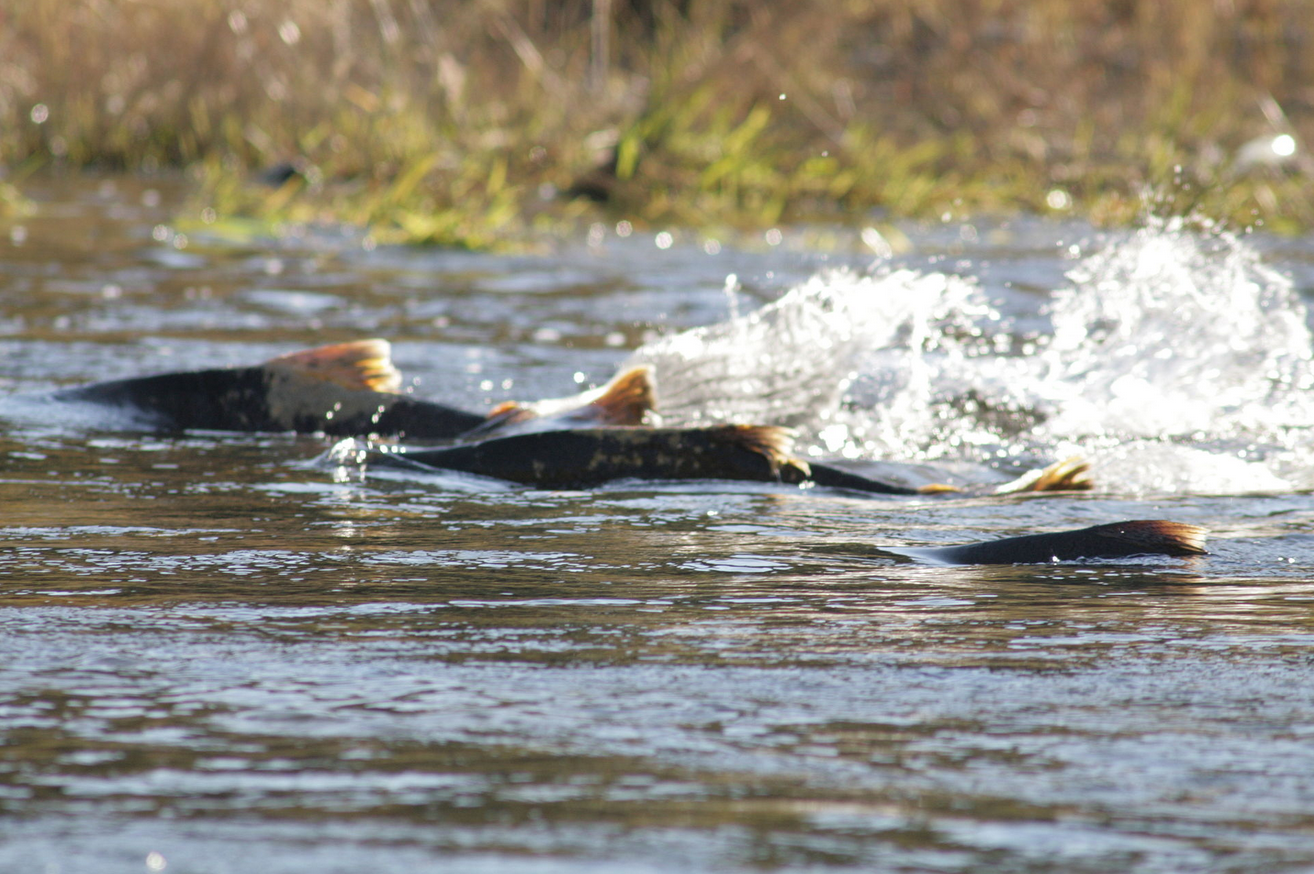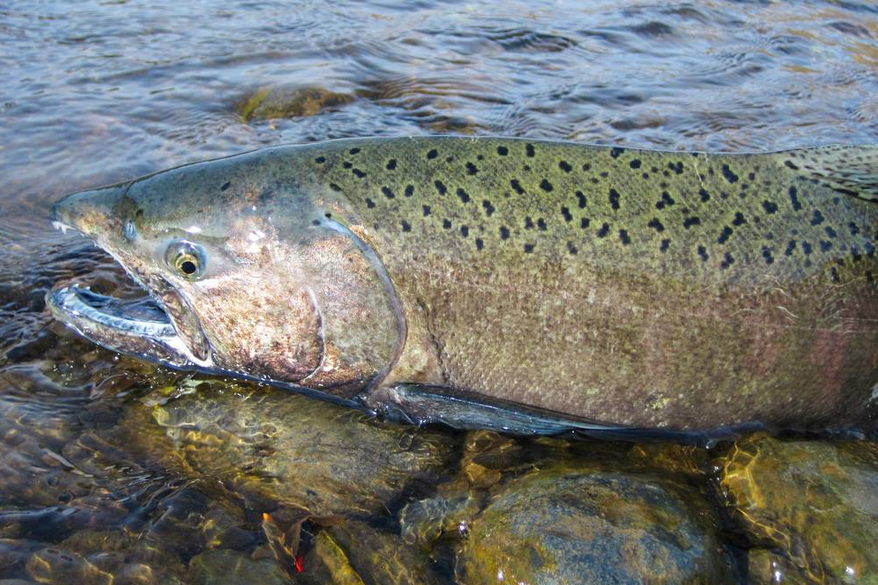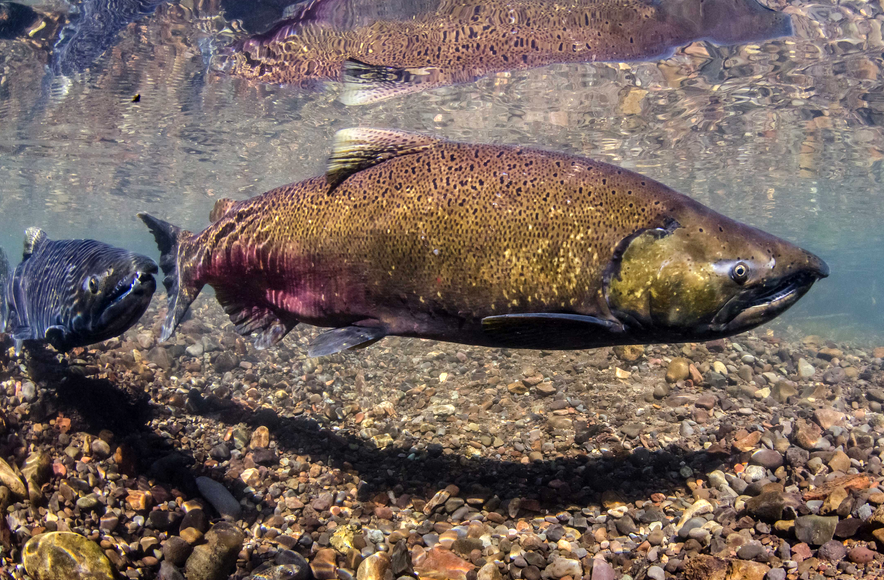Editor’s note: The following is a chapter extracted from American Notes, by Rudyard Kipling (published 1891). All spelling in the original.
The race is neither to the swift nor the battle to the strong; but time and chance cometh to all.
I HAVE lived!
The American Continent may now sink under the sea, for I have taken the best that it yields, and the best was neither dollars, love, nor real estate.
Hear now, gentlemen of the Punjab Fishing Club, who whip the reaches of the Tavi, and you who painfully import trout over to Octamund, and I will tell you how old man California and I went fishing, and you shall envy.
We returned from The Dalles to Portland by the way we had come, the steamer stopping en route to pick up a night’s catch of one of the salmon wheels on the river, and to deliver it at a cannery downstream.
When the proprietor of the wheel announced that his take was two thousand two hundred and thirty pounds weight of fish, “and not a heavy catch neither,” I thought he lied. But he sent the boxes aboard, and I counted the salmon by the hundred—huge fifty-pounders hardly dead, scores of twenty and thirty pounders, and a host of smaller fish. They were all Chenook salmon, as distinguished from the “steel head” and the “silver side.” That is to say, they were royal salmon, and California and I dropped a tear over them, as monarchs who deserved a better fate; but the lust of slaughter entered into our souls, and we talked fish and forgot the mountain scenery that had so moved us a day before.
The steamer halted at a rude wooden warehouse built on piles in a lonely reach of the river, and sent in the fish. I followed them up a scale-strewn, fishy incline that led to the cannery. The crazy building was quivering with the machinery on its floors, and a glittering bank of tin scraps twenty feet high showed where the waste was thrown after the cans had been punched.
Only Chinamen were employed on the work, and they looked like blood-besmeared yellow devils as they crossed the rifts of sunlight that lay upon the floor. When our consignment arrived, the rough wooden boxes broke of themselves as they were dumped down under a jet of water, and the salmon burst out in a stream of quicksilver. A Chinaman jerked up a twenty-pounder, beheaded and detailed it with two swift strokes of a knife, flicked out its internal arrangements with a third, and case it into a blood-dyed tank. The headless fish leaped from under his hands as though they were facing a rapid. Other Chinamen pulled them from the vat and thrust them under a thing like a chaff-cutter, which, descending, hewed them into unseemly red gobbets fit for the can.
More Chinamen, with yellow, crooked fingers, jammed the stuff into the cans, which slid down some marvellous machine forthwith, soldering their own tops as they passed. Each can was hastily tested for flaws, and then sunk with a hundred companions into a vat of boiling water, there to be half cooked for a few minutes. The cans bulged slightly after the operation, and were therefore slidden along by the trolleyful to men with needles and soldering-irons who vented them and soldered the aperture. Except for the label, the “Finest Columbia Salmon” was ready for the market. I was impressed not so much with the speed of the manufacture as the character of the factory. Inside, on a floor ninety by forty, the most civilized and murderous of machinery. Outside, three footsteps, the thick-growing pines and the immense solitude of the hills. Our steamer only stayed twenty minutes at that place, but I counted two hundred and forty finished cans made from the catch of the previous night ere I left the slippery, blood-stained, scale-spangled, oily floors and the offal-smeared Chinamen.
We reached Portland, California and I crying for salmon, and a real-estate man, to whom we had been intrusted by an insurance man, met us in the street, saying that fifteen miles away, across country, we should come upon a place called Clackamas, where we might perchance find what we desired. And California, his coat-tails flying in the wind, ran to a livery-stable and chartered a wagon and team forthwith. I could push the wagon about with one hand, so light was its structure. The team was purely American—that is to say, almost human in its intelligence and docility. Some one said that the roads were not good on the way to Clackamas, and warned us against smashing the springs. “Portland,” who had watched the preparations, finally reckoned “He’d come along, too;” and under heavenly skies we three companions of a day set forth, California carefully lashing our rods into the carriage, and the by-standers overwhelming us with directions as to the saw-mills we were to pass, the ferries we were to cross, and the sign-posts we were to seek signs from. Half a mile from this city of fifty thousand souls we struck (and this must be taken literally) a plank road that would have been a disgrace to an Irish village.
Then six miles of macadamized road showed us that the team could move. A railway ran between us and the banks of the Willamette, and another above us through the mountains. All the land was dotted with small townships, and the roads were full of farmers in their town wagons, bunches of tow-haired, boggle-eyed urchins sitting in the hay behind. The men generally looked like loafers, but their women were all well dressed.
Brown braiding on a tailor-made jacket does not, however, consort with hay-wagons. Then we struck into the woods along what California called a camina reale—a good road—and Portland a “fair track.” It wound in and out among fire-blackened stumps under pine-trees, along the corners of log fences, through hollows, which must be hopeless marsh in the winter, and up absurd gradients. But nowhere throughout its length did I see any evidence of road-making. There was a track—you couldn’t well get off it, and it was all you could do to stay on it. The dust lay a foot thick in the blind ruts, and under the dust we found bits of planking and bundles of brushwood that sent the wagon bounding into the air. The journey in itself was a delight. Sometimes we crashed through bracken; anon, where the blackberries grew rankest, we found a lonely little cemetery, the wooden rails all awry and the pitiful, stumpy head-stones nodding drunkenly at the soft green mullions. Then, with oaths and the sound of rent underwood, a yoke of mighty bulls would swing down a “skid” road, hauling a forty-foot log along a rudely made slide.
A valley full of wheat and cherry-trees succeeded, and halting at a house, we bought ten-pound weight of luscious black cherries for something less than a rupee, and got a drink of icy-cold water for nothing, while the untended team browsed sagaciously by the road-side. Once we found a way-side camp of horse-dealers lounging by a pool, ready for a sale or a swap, and once two sun-tanned youngsters shot down a hill on Indian ponies, their full creels banging from the high-pommelled saddle. They had been fishing, and were our brethren, therefore. We shouted aloud in chorus to scare a wild cat; we squabbled over the reasons that had led a snake to cross a road; we heaved bits of bark at a venturesome chipmunk, who was really the little gray squirrel of India, and had come to call on me; we lost our way, and got the wagon so beautifully fixed on a khud-bound road that we had to tie the two hind wheels to get it down.
Above all, California told tales of Nevada and Arizona, of lonely nights spent out prospecting, the slaughter of deer and the chase of men, of woman—lovely woman—who is a firebrand in a Western city and leads to the popping of pistols, and of the sudden changes and chances of Fortune, who delights in making the miner or the lumber-man a quadruplicate millionaire and in “busting” the railroad king.

That was a day to be remembered, and it had only begun when we drew rein at a tiny farm-house on the banks of the Clackamas and sought horse feed and lodging, ere we hastened to the river that broke over a weir not a quarter of a mile away. Imagine a stream seventy yards broad divided by a pebbly island, running over seductive “riffles” and swirling into deep, quiet pools, where the good salmon goes to smoke his pipe after meals. Get such a stream amid fields of breast-high crops surrounded by hills of pines, throw in where you please quiet water, long-fenced meadows, and a hundred-foot bluff just to keep the scenery from growing too monotonous, and you will get some faint notion of the Clackamas. The weir had been erected to pen the Chenook salmon from going further up-stream. We could see them, twenty or thirty pounds, by the score in the deep pools, or flying madly against the weir and foolishly skinning their noses. They were not our prey, for they would not rise at a fly, and we knew it. All the same, when one made his leap against the weir, and landed on the foot-plank with a jar that shook the board I was standing on, I would fain have claimed him for my own capture.
Portland had no rod. He held the gaff and the whiskey. California sniffed up-stream and down-stream, across the racing water, chose his ground, and let the gaudy fly drop in the tail of a riffle. I was getting my rod together, when I heard the joyous shriek of the reel and the yells of California, and three feet of living silver leaped into the air far across the water. The forces were engaged.
The salmon tore up-stream, the tense line cutting the water like a tide-rip behind him, and the light bamboo bowed to breaking. What happened thereafter I cannot tell. California swore and prayed, and Portland shouted advice, and I did all three for what appeared to be half a day, but was in reality a little over a quarter of an hour, and sullenly our fish came home with spurts of temper, dashes head on and sarabands in the air, but home to the bank came he, and the remorseless reel gathered up the thread of his life inch by inch. We landed him in a little bay, and the spring weight in his gorgeous gills checked at eleven and one half pounds. Eleven and one half pounds of fighting salmon! We danced a war-dance on the pebbles, and California caught me round the waist in a hug that went near to breaking my ribs, while he shouted:—“Partner! Partner! This is glory! Now you catch your fish! Twenty-four years I’ve waited for this!”
I went into that icy-cold river and made my cast just above the weir, and all but foul-hooked a blue-and-black water-snake with a coral mouth who coiled herself on a stone and hissed maledictions.
The next cast — ah, the pride of it, the regal splendor of it! the thrill that ran down from finger-tip to toe! Then the water boiled. He broke for the fly and got it. There remained enough sense in me to give him all he wanted when he jumped not once, but twenty times, before the up-stream flight that ran my line out to the last half-dozen turns, and I saw the nickelled reel-bar glitter under the thinning green coils. My thumb was burned deep when I strove to stopper the line.
I did not feel it till later, for my soul was out in the dancing weir, praying for him to turn ere he took my tackle away. And the prayer was heard. As I bowed back, the butt of the rod on my left hip-bone and the top joint dipping like unto a weeping willow, he turned and accepted each inch of slack that I could by any means get in as a favor from on high. There lie several sorts of success in this world that taste well in the moment of enjoyment, but I question whether the stealthy theft of line from an able-bodied salmon who knows exactly what you are doing and why you are doing it is not sweeter than any other victory within human scope. Like California’s fish, he ran at me head on, and leaped against the line, but the Lord gave me two hundred and fifty pairs of fingers in that hour. The banks and the pine-trees danced dizzily round me, but I only reeled—reeled as for life—reeled for hours, and at the end of the reeling continued to give him the butt while he sulked in a pool. California was further up the reach, and with the corner of my eye I could see him casting with long casts and much skill. Then he struck, and my fish broke for the weir in the same instant, and down the reach we came, California and I, reel answering reel even as the morning stars sing together.
The first wild enthusiasm of capture had died away. We were both at work now in deadly earnest to prevent the lines fouling, to stall off a down-stream rush for shaggy water just above the weir, and at the same time to get the fish into the shallow bay down-stream that gave the best practicable landing. Portland bid us both be of good heart, and volunteered to take the rod from my hands.
I would rather have died among the pebbles than surrender my right to play and land a salmon, weight unknown, with an eight-ounce rod. I heard California, at my ear, it seemed, gasping: “He’s a fighter from Fightersville, sure!” as his fish made a fresh break across the stream. I saw Portland fall off a log fence, break the overhanging bank, and clatter down to the pebbles, all sand and landing-net, and I dropped on a log to rest for a moment. As I drew breath the weary hands slackened their hold, and I forgot to give him the butt.
A wild scutter in the water, a plunge, and a break for the head-waters of the Clackamas was my reward, and the weary toil of reeling in with one eye under the water and the other on the top joint of the rod was renewed. Worst of all, I was blocking California’s path to the little landing bay aforesaid, and he had to halt and tire his prize where he was.
“The father of all the salmon!” he shouted. “For the love of Heaven, get your trout to bank, Johnny Bull!”
But I could do no more. Even the insult failed to move me. The rest of the game was with the salmon. He suffered himself to be drawn, skip-ping with pretended delight at getting to the haven where I would fain bring him. Yet no sooner did he feel shoal water under his ponderous belly than he backed like a torpedo-boat, and the snarl of the reel told me that my labor was in vain. A dozen times, at least, this happened ere the line hinted he had given up the battle and would be towed in. He was towed. The landing-net was useless for one of his size, and I would not have him gaffed. I stepped into the shallows and heaved him out with a respectful hand under the gill, for which kindness he battered me about the legs with his tail, and I felt the strength of him and was proud. California had taken my place in the shallows, his fish hard held. I was up the bank lying full length on the sweet-scented grass and gasping in company with my first salmon caught, played and landed on an eight-ounce rod. My hands were cut and bleeding, I was dripping with sweat, spangled like a harlequin with scales, water from my waist down, nose peeled by the sun, but utterly, supremely, and consummately happy.

The beauty, the darling, the daisy, my Salmon Bahadur, weighed twelve pounds, and I had been seven-and-thirty minutes bringing him to bank! He had been lightly hooked on the angle of the right jaw, and the hook had not wearied him. That hour I sat among princes and crowned heads greater than them all. Below the bank we heard California scuffling with his salmon and swearing Spanish oaths. Portland and I assisted at the capture, and the fish dragged the spring balance out by the roots. It was only constructed to weigh up to fifteen pounds. We stretched the three fish on the grass—the eleven and a half, the twelve and fifteen pounder—and we gave an oath that all who came after should merely be weighed and put back again.
How shall I tell the glories of that day so that you may be interested? Again and again did California and I prance down that reach to the little bay, each with a salmon in tow, and land him in the shallows. Then Portland took my rod and caught some ten-pounders, and my spoon was carried away by an unknown leviathan. Each fish, for the merits of the three that had died so gamely, was hastily hooked on the balance and flung back. Portland recorded the weight in a pocket-book, for he was a real-estate man. Each fish fought for all he was worth, and none more savagely than the smallest, a game little six-pounder. At the end of six hours we added up the list. Read it. Total: Sixteen fish; aggregate weight, one hundred and forty pounds. The score in detail runs something like this—it is only interesting to those concerned: fifteen, eleven and a half, twelve, ten, nine and three quarters, eight, and so forth; as I have said, nothing under six pounds, and three ten-pounders.
Very solemnly and thankfully we put up our rods—it was glory enough for all time—and returned weeping in each other’s arms, weeping tears of pure joy, to that simple, bare-legged family in the packing-case house by the water-side.
The old farmer recollected days and nights of fierce warfare with the Indians “way back in the fifties,” when every ripple of the Columbia River and her tributaries hid covert danger. God had dowered him with a queer, crooked gift of expression and a fierce anxiety for the welfare of his two little sons—tanned and reserved children, who attended school daily and spoke good English in a strange tongue.
His wife was an austere woman, who had once been kindly, and perhaps handsome.
Very many years of toil had taken the elasticity out of step and voice. She looked for nothing better than everlasting work—the chafing detail of housework—and then a grave somewhere up the hill among the blackberries and the pines.
But in her grim way she sympathized with her eldest daughter, a small and silent maiden of eighteen, who had thoughts very far from the meals she tended and the pans she scoured.
We stumbled into the household at a crisis, and there was a deal of downright humanity in that same. A bad, wicked dress-maker had promised the maiden a dress in time for a to-morrow’s rail-way journey, and though the barefooted Georgy, who stood in very wholesome awe of his sister, had scoured the woods on a pony in search, that dress never arrived. So, with sorrow in her heart and a hundred Sister-Anne glances up the road, she waited upon the strangers and, I doubt not, cursed them for the wants that stood between her and her need for tears. It was a genuine little tragedy. The mother, in a heavy, passionless voice, rebuked her impatience, yet sat up far into the night, bowed over a heap of sewing for the daughter’s benefit.
These things I beheld in the long marigold-scented twilight and whispering night, loafing round the little house with California, who un-folded himself like a lotus to the moon, or in the little boarded bunk that was our bedroom, swap-ping tales with Portland and the old man.
Most of the yarns began in this way:—“Red Larry was a bull-puncher back of Lone County, Montana,” or “There was a man riding the trail met a jack-rabbit sitting in a cactus,” or “’Bout the time of the San Diego land boom, a woman from Monterey,” etc.
You can try to piece out for yourselves what sort of stories they were.









A great story, and great writing! Thanks for sharing this.